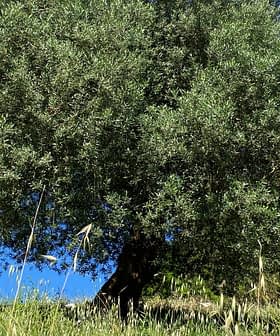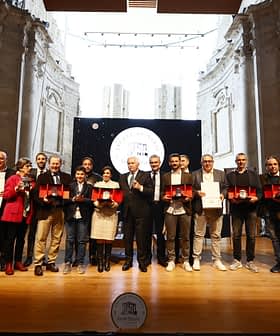The harvest was carried out at the Olive Tree of Peace in Palermo, Sicily, a few weeks after the regional superintendent declared it a cultural interest site.
A tribute to judge and prosecuting magistrate Paolo Borsellino, who is considered one of the most important personalities in the fight against organized crime in Italy and internationally, the tree stands as a symbol of regeneration, solidarity, peace, civil commitment and justice.
“This tree has gained an ever-increasing social importance, which is why we have committed ourselves to protecting it with the institutions,” Francesca Grasta, co-founder of the Paolo and Rita Borsellino Study Center, told Olive Oil Times.
See Also:An Olive Tree Garden of Peace is Innagurated on Crete“Some years ago, we started collecting the olives, which were processed for table consumption and given away to the community,” she added. “This is the second year that we produce extra virgin olive oil that is donated as well. Indeed, the Olive Tree of Peace belongs to the community.”

The Olive Tree of Peace was planted on the spot of anti-mafia prosecutor Paolo Borsellino’s 1992 assassination. (Photo: Paolo and Rita Borsellino Study Center)
Borsellino was included in Time Magazine’s 2006 list of heroes together with his colleague and close friend Giovanni Falcone. They worked together in the fight for justice and were both assassinated a few months apart in mafia terrorist attacks.
The judge was killed on July 19, 1992, by a car bomb in Via D’Amelio, Palermo, near the house of his mother, Maria Pia Lepanto, along with the five security guards, Agostino Catalano, Walter Eddie Cosina, Emanuela Loi, Claudio Traina and Vincenzo Fabio Li Muli. They were all awarded a gold medal for civil valor.
“The idea of planting the olive tree was born from a desire of Pia,” Grasta said. “In the following months, there was a possibility to set a commemorative monument on the site of the attack, but during a conversation with her daughter Rita, Pia confided to her that she wanted to reclaim that tragic event through something that represents life, therefore a tree, and specifically an olive tree for its meaning of peace.”

Harvest at the Olive Tree of Peace in Palermo (Photo: Paolo and Rita Borsellino Study Center)
“She really wanted that spot to become a place of life and peace,” she added. “Rita added that it would have been even more significant if it came from Bethlehem.”
The proposal to plant the tree was launched along with a petition to gather signatures. As many as 20,000 signatures from Italy and abroad reached Palermo quickly, and the procedure started.
The non-governmental organization International Cooperation South South (CISS) helped establish the first contacts, then the Palestinian and Israeli Women in Black Peace Movement supported the organization and made arrangements with the Salesian community of the Cremisan valley in Bethlehem – the plant came from the lands of the monastery, where the Italian monks produce olive oil from ancient olive trees since the 1800s.
One year later, during a ceremony for the first anniversary of the event, the chasm caused by the explosion was filled with earth, and the Olive Tree of Peace was planted.
“The seedling arrived by plane, and for security reasons, it was not even possible to keep the clod of soil around the roots,” Grasta said. “To be truthful, it looked so fragile that nobody thought it could survive nor thrive amid city buildings.”
“Yet, today, it is beautiful and flourishing,” she added. “Many events of high social value are held under its branches throughout the year, including activities with students coming from all over Italy and abroad who the study center regularly hosts.”

Each autumn a local cooperative harvests and mills the olives before donating the resulting olive oil back to the community. (Photo: Paolo and Rita Borsellino Study Center)
The olive harvest has become a heartfelt event. The fruits are carefully picked by hand and delivered to a mill in Corleone that employs workers of the cooperative Lavoro e non solo, which manages lands confiscated from the mafia.
“The cooperative helps us during the harvest, which is also attended by those engaged in civil service at the study center and several other groups of volunteers,” Grasta said. “Emanuele Filiberto, one of Borsellino’s security guards who was not on duty that day, participates every year.”
“The days of the anniversary of the attack are the culmination of the annual activities,” she added. “We spend the night in prayer, and in the morning, with the children from the suburbs of Palermo, we color the street, enlivening it with dances around the tree, music and theater activities.”
“With its atmosphere of enthusiasm and collaboration, the harvest is yet another great community event that helps us fulfill Pia’s wish that this may be a place of life,” Grasta concluded.








